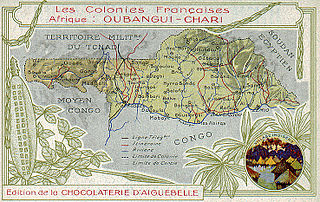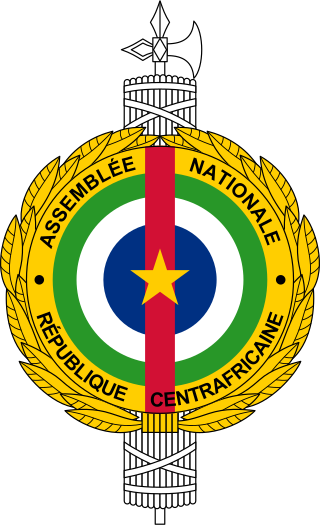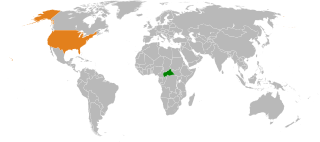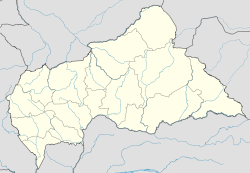
The Central African Republic (CAR), formerly known as Ubangi-Shari, is a landlocked country in Central Africa. It is bordered by Chad to the north, Sudan to the northeast, South Sudan to the east, the Democratic Republic of the Congo to the south, the Republic of the Congo to the southwest, and Cameroon to the west. Bangui is the country's capital and largest city, at the border with the Democratic Republic of the Congo. The Central African Republic covers a land area of about 620,000 square kilometres (240,000 sq mi). As of 2021, it had an estimated population of around 5.5 million. As of 2024, the Central African Republic is the scene of a civil war, which has been ongoing since 2012.

The history of the Central African Republic is roughly composed of four distinct periods. The earliest period of settlement began around 10,000 years ago when nomadic people first began to settle, farm and fish in the region. The next period began around 10,000 years prior.

The economy of the Central African Republic is $2.321 billion by gross domestic product as of 2019, even lower than much smaller countries such as Barbados with an estimated annual per capita income of just $805 as measured by purchasing power parity in 2019.

Bangui is the capital and largest city of the Central African Republic. It was established as a French outpost in 1889 and named after its location on the northern bank of the Ubangi River ; the Ubangi itself was named from the Bobangi word for the "rapids" located beside the settlement, which marked the end of navigable water north from Brazzaville. The majority of the population of the Central African Republic lives in the western parts of the country, in Bangui and the surrounding area.

The Democratic Republic of the Congo is a country in Central Africa. By land area, the Congo is the second-largest country in Africa and the 11th-largest in the world. With a population of around 109 million, the Democratic Republic of the Congo is the most populous Francophone country in the world. The national capital and largest city is Kinshasa, which is also the economic center. The country is bordered by the Republic of the Congo, Central African Republic, South Sudan, Uganda, Rwanda, Burundi, Tanzania, Zambia, Angola, the Cabinda exclave of Angola, and the South Atlantic Ocean.

The Central African Empire was established on 4 December 1976 when the then-President of the Central African Republic, Jean-Bédel Bokassa, declared himself Emperor of Central Africa. The empire would fall less than three years later when French and Central African forces overthrew Bokassa and re-established the Central African Republic on 21 September 1979.

Central Africa is a subregion of the African continent comprising various countries according to different definitions. Middle Africa is an analogous term used by the United Nations in its geoscheme for Africa and consists of the following countries: Angola, Cameroon, Central African Republic, Chad, Democratic Republic of the Congo, Republic of the Congo, Equatorial Guinea, Gabon, and São Tomé and Príncipe. The United Nations Office for Central Africa also includes Burundi and Rwanda in the region, which are considered part of East Africa in the geoscheme. These eleven countries are members of the Economic Community of Central African States (ECCAS). Six of those countries are also members of the Economic and Monetary Community of Central Africa (CEMAC) and share a common currency, the Central African CFA franc.

The Central African Republic national football team, nicknamed Les Fauves, is the national team of the Central African Republic and is controlled by the Central African Football Federation. They are a member of CAF. Despite being traditionally one of the weakest teams in Africa and the world, they recently achieved success. They won the 2009 CEMAC Cup by beating Gabon in the semi-finals and Equatorial Guinea in the final 3–0. Their FIFA ranking rose from 202nd in August 2010 to 89th by July 2011. On 10 October 2010, they earned a shock 2012 Africa Cup of Nations qualifier win at home against Algeria 2–0, which put them top of their qualification group. The team won its first FIFA World Cup qualifier on 2 June 2012 after beating Botswana 2–0 at home.

The National Assembly is the lower house of the Parliament of the Central African Republic. Members are elected in single-member constituencies using the two-round system. Members serve five-year terms.

West Africa Time, or WAT, is a time zone used in west-central Africa. West Africa Time is one hour ahead of Coordinated Universal Time (UTC+01:00), which aligns it with Central European Time (CET) during winter, and Western European Summer Time (WEST) / British Summer Time (BST) during summer.

The Central African Republic has sent athletes to every Summer Olympic Games held between 1984 and 2024, as well as its first appearance in 1968. The country, however, has yet to win an Olympic medal. No athletes from the Central African Republic have competed in any Winter Olympic Games.

Central African Republic–United States relations are the international relations between Central African Republic and the United States of America. The relations have generally been positive, although concerns over the pace of political and economic liberalization and human rights have affected the degree of support provided by the United States to the Central African Republic.

Congo, officially the Republic of the Congo or Congo Republic, is a country located on the western coast of Central Africa to the west of the Congo River. It is bordered to the west by Gabon, to the northwest by Cameroon, to the northeast by the Central African Republic, to the southeast by the Democratic Republic of the Congo, to the south by the Angolan exclave of Cabinda, and to the southwest by the Atlantic Ocean.

Christianity is the predominant religion in Central African Republic, with significant minorities of the adherents of Islam and Traditional African religions.

Health in the Central African Republic has been degraded by years of internal conflict and economic turmoil since independence from France in 1960. One sixth of the country's population is in need of acute medical care. Endemic diseases put a high demand on the health infrastructure, which requires outside assistance to sustain itself.

Central African cuisine includes the cuisines, cooking traditions, practices, ingredients and foods of the Central African Republic (CAR). Indigenous agriculture in the country includes millet, sorghum, banana, yam, okra, yellow onion, garlic, spinach, rice and palm oil. Imported crops of American origin include maize, manioc (cassava), peanuts, chili peppers, sweet potato and tomato. Additional foods include onions, garlic, chiles and peanuts.

The Central African Republic Civil War is an ongoing civil war in the Central African Republic (CAR) involving the government, rebels from the Séléka coalition, and Anti-balaka militias.

Visitors to the Central African Republic must obtain a visa from one of the Central African Republic diplomatic missions or French diplomatic missions unless they come from one of the visa exempt countries.














